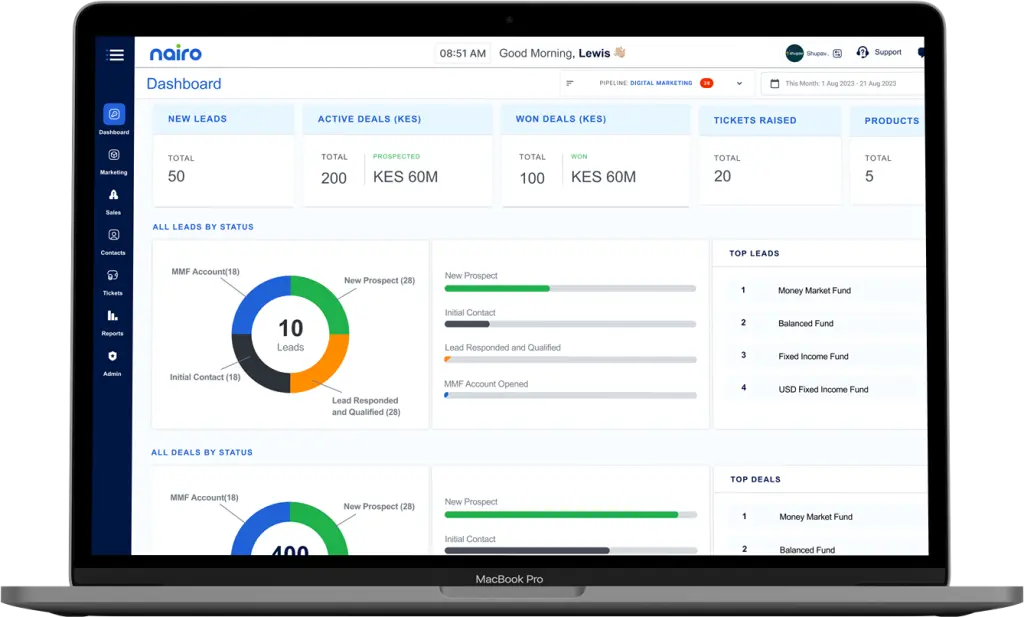Customer Relationship Management (CRM) software promises to streamline sales, boost customer loyalty, and organize your business’s contacts. Yet many African small and mid-sized enterprises (SMEs) find that after investing time and money into a CRM, they end up right back where they started – with messy spreadsheets or, worse, lost opportunities. Why do so many CRMs fail African businesses? Let’s explore the common pitfalls and how to avoid them.
The Big Promise vs. The Harsh Reality
Modern CRMs are marketed as the be-all and end-all for managing customer relationships. In theory, a good CRM should help you track every lead, follow up consistently, and know exactly what’s happening in your sales pipeline. In reality, many businesses on the continent struggle to realize these benefits. Globally, CRM implementation failure rates have remained disturbingly high over the past decades. African businesses face additional challenges that can make typical CRM systems fall flat.
Picture this: A small Nairobi-based distributor excitedly adopts a popular CRM from abroad. The promise is huge – all their customer info in one place, automatic reminders, sales forecasts – a dream come true. Fast forward a few months: the team has stopped logging in. The sales manager complains it’s “too complicated,” the field reps went back to using WhatsApp and notebooks, and management sees no improvement in sales. Frustrated, they shelved the expensive software. This story is all too common.
It’s not that African companies don’t need CRM – they absolutely do. The issue is that most popular CRM platforms were built with large Western markets in mind. Using these tools in an African business context often reveals a disconnect between the software’s design and the on-the-ground realities local companies face. Here are some of the top reasons why CRMs fail in Africa’s business environment:
Top Reasons CRMs Fail for African SMEs
- Too Complex and Over-engineered: Many well-known CRM systems come packed with features upon features. For a resource-strapped SME, this can be overwhelming. Instead of helping, an overly complex tool ends up unused. Team members find it confusing, or only use 10% of the features. If a CRM feels like rocket science, busy sales teams will quietly abandon it. Complexity is a major reason CRM projects fail, as companies focus on fancy technology over usable, people-friendly design. In some cases, companies even hire expensive consultants to customize the CRM, which small businesses can ill afford. A tool meant to save time ends up consuming time.
- Not Built for Local Needs: A lot of foreign CRM tools lack awareness of local business practices. For example, an SME in Africa might rely heavily on WhatsApp or SMS to communicate with leads – but many CRMs don’t integrate these channels. Local sales cycles and customer behaviors can differ from those abroad. When your CRM isn’t flexible enough to capture how you do business – for example, tracking payments via mobile money or handling customers who go by a single name – it feels alien. For instance, some CRMs assume you’ll input a US-style address for each customer (nonsensical if your clients are identified simply by market stalls or landmarks). Or they expect integrations with Salesforce or Oracle, when you really need integrations with mobile money platforms or local accounting software. These cultural and infrastructural mismatches make a generic CRM cumbersome in daily use.
- Connectivity and Infrastructure Issues: Cloud-based CRMs assume constant high-speed internet access. In reality, internet connectivity can be spotty or expensive in certain regions. If your sales reps struggle to load a web dashboard due to slow internet, they’ll stop using the CRM. Even in major cities, an unexpected outage or high data costs can limit how and when staff use the system. If your CRM only lives in the cloud and doesn’t accommodate low-bandwidth scenarios, it becomes an unreliable partner. In some African rural areas, only about 28% have access to reliable mobile internet – a traditional online-only CRM simply isn’t practical there. Without offline capabilities or a good mobile app, a CRM fails when the network does.
- High Cost and Poor ROI: The sticker price of many popular CRMs is a huge barrier. Paying $50 or $100 per user per month in US dollars can be prohibitively expensive once you convert to local currency. And that’s before considering add-ons or integration costs. Many SMEs sign up for a “free trial” only to realize later that the essential features require an upgrade. If a CRM drains your budget without delivering clear value, it feels like a bad investment. Choosing the wrong CRM software that doesn’t align with your goals can lead to wasted money and failure to see any return. Many SMEs operate on thin margins; a hefty monthly software bill (plus the requirement of an international credit card to pay it) just doesn’t fly. And measuring ROI can be tricky – if the CRM wasn’t implemented well, it’s hard to justify the spend to begin with.
- Lack of Training and Support: Implementing a CRM isn’t just a technical install – your team needs to learn how to use it effectively. Many foreign providers have support documentation in English (or another major language) but no guidance tuned to an African SME context. Time zone differences make live support difficult. Without hands-on training, sales teams often revert to old habits. We’ve seen cases where a company buys a CRM subscription and simply tells the team to “use it” with no further guidance. It’s no surprise when after a month, hardly anyone has updated a record. Proper onboarding – ideally with examples relevant to an African SME (not just generic tutorials about managing Fortune 500 pipelines) – is crucial. A CRM that’s not fully adopted by its users is as good as dead. It’s common to see companies “shelf” a CRM because employees never got comfortable with it.
- Employee Resistance to Change: Let’s face it – people naturally resist new systems, especially if they’ve managed relationships informally or with spreadsheets for years. If leadership doesn’t clearly communicate the benefits, or if the CRM seems to create more work, staff won’t buy in. This isn’t unique to Africa, but it’s magnified in environments where digital tools are a newer addition to business operations. In African markets, where business relationships are often built on personal contact and trust, some salespeople might feel a CRM is too impersonal or an unnecessary formality. Change management is as important as the technology itself. Without buy-in, even the best CRM will fail to take root.
In short, a CRM fails African businesses when it’s not aligned with their reality. When the tool is too complicated, too disconnected, or too costly, SMEs simply can’t reap the benefits. They might abandon the CRM half-implemented – one study noted that many companies end up tolerating “below-par performance and little to no ROI” from misfit CRM projects. African teams often then fall back to manual methods, concluding that “CRMs just don’t work for us.”
Turning Failures into Success: What’s Needed
So, how can we ensure a CRM succeeds for African businesses? The failure of others is rich with lessons. Here’s what to look for (and demand) in a CRM to avoid the pitfalls:
- Simplicity and Ease of Use: The system must be intuitive. If your sales rep can use a smartphone, they should be able to figure out the CRM with minimal training. Clean interface, straightforward features, and a short learning curve are key. When a CRM is easy, teams actually use it daily – and consistent usage is the only way it will deliver results.
- Customization to Local Workflows: Choose a CRM that you can tailor to your processes, not the other way around. It should allow custom fields and tags that make sense for your market. For instance, if you need to track national ID or preferred language for clients, the CRM should let you. A one-size-fits-all approach from abroad often doesn’t fit; you need a flexible tool that molds to your business quirks.
- Offline Capability & Mobile Access: A great CRM for Africa must have a solid mobile app or offline mode. Your field sales agents might visit clients in areas with poor connectivity. They should be able to pull up client records or update notes on a phone or tablet without internet, and sync later. This ensures the CRM stays useful even when the network is down.
- Affordable Pricing & Clear ROI: Look for CRM solutions with pricing that matches local economic realities. Some new providers understand this and offer plans at a fraction of the cost of big-name tools, or even a free tier for small teams. The goal is a CRM that pays for itself in new sales. In fact, CRM is known to have a high return on investment – by some analyses, every $1 spent on CRM yields about $8.71 in returns. Your CRM should feel like a revenue generator, not a cost center.
- Local Support and Guidance: It’s immensely helpful if your CRM vendor offers support tuned to your region. That could mean tutorials with local business examples, on-call support during your working hours, or a customer success team that understands the challenges you face. If your team hits a snag, timely help can keep adoption on track. Also, invest in initial training sessions to get everyone onboard and excited.
- Scalable and Lightweight: Start with the basics that solve your immediate pain points (e.g., contact management and follow-up reminders). The CRM should let you start simple and add more features over time as you grow. Avoid bloated systems that slow you down. A lightweight solution will run better on average internet speeds and hardware, too.
NairoCRM: A CRM That Gets You
The frustrations above are exactly why NairoCRM is being developed as a locally-aware alternative. We’ve seen why most CRMs fail African businesses – and we’re determined to do things differently. NairoCRM is built from the ground up with African SMEs in mind:
- It’s simple and clean, focusing on core sales and customer management needs without the bloat.
- It works seamlessly on mobile devices and will offer offline functionality for those times when you’re off the grid.
- We’re pricing NairoCRM in a way that’s sustainable for local businesses (no dollar exchange rate shocks!) while delivering great value.
- Most importantly, we offer local support and onboarding. Our team understands the African market context, and we’ll guide you every step of the way to CRM success.
In markets where CRMs have been adapted well, businesses thrive – for example, in some regions nearly 70% of businesses have implemented CRM solutions as of 2022, reaping benefits like higher sales and customer retention. There’s no reason African entrepreneurs should be left behind with subpar tools or failed projects. With the right approach, your CRM can be the engine that drives your growth rather than a roadblock.
Bottom line: Don’t write off CRM just because many have failed. Instead, learn from those failures and choose a solution designed for you. When you align the tool with local needs, the success rates skyrocket. NairoCRM aims to be that success story for African businesses – a CRM that works because it was built for your reality.
Conclusion: Success is Possible with the Right CRM
Most CRM failures in African businesses boil down to a mismatch – the wrong tool for the job, or the right tool implemented the wrong way. By demanding simplicity, local relevance, and support, SMEs can turn CRM from a frustrating expense into a game-changing asset.
Why struggle with generic software that doesn’t “get” your business? It’s time for a CRM that understands Africa’s unique context and delivers on its promises. NairoCRM is on a mission to fill that gap. We’re combining global best practices with local insights to ensure our CRM actually helps your business build relationships and close deals, not hinder it.
Ready to move past yesterday’s failures and set your business up for success? Join the NairoCRM waitlist today for early access to a CRM built for you. Be among the first to experience a customer management solution that truly speaks your language (figuratively and literally) and enjoy exclusive benefits as an early adopter. Don’t let the mistakes of old hold your business back – with NairoCRM, you can finally harness the full power of CRM and watch your relationships and revenue, thrive.





